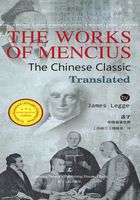
CHAPTER VII
1. Mencius said, 'When right government prevails in the kingdom, princes of little virtue are submissive to those of great, and those of little worth to those of great. When bad government prevails in the kingdom,princes of small power are submissive to those of great, and the weak to the strong. Both these cases are the rule of Heaven. They who accord with Heaven are preserved, and they who rebel against Heaven perish.
2. 'The duke Ching of Ch'î said, "Not to be able to command others, and at the same time to refuse to receive their commands, is to cut one's self off from all intercourse with others."


the duke sought his blessing, that he might attain a like longevity. The old man then prayed, 'May my ruler enjoy great longevity, despising gems and gold, and making men his jewels!' At the duke's request he prayed a second time, that he might not be ashamed to learn even from his inferiors, and a third time,'May my ruler not offend against his ministers and the people!' This answer offended the duke. 'A son', he said, 'may offend against his father, and a minister against his ruler. But how can a ruler offend against his ministers?' The old man replied, 'An offending son may get forgiveness through the intercessions of ants and uncles. An offending minister may be forgiven by the intercession of the ruler's favorite against T'ang, and Châu offended against Wû;—those were cases in point. There was no forgiveness for them.'所慕,—'whom they affect', not what. Observe the force of 故.
CHAPTER7. HOW THE SUBJECTION OF ONE STATE TO ANOTHER IS DETERMINED AT DIFFERENT TIMES. A PRINCE'S ONLY SECURITY FOR SAFETY AND PROSPERITY IS IN BEING BENEVOLENT.
1. Many commentators say that by 大德 and 大贤 reference is made to the sovereign, but the declarations may as well be taken generally. 斯二者天也,—'Heaven', it is said, 'embraces here the ideas of what must be in reason, and the different powers of the contrasted States (兼理势言).' This is true, but why sink the idea of a Providential government which is implied in 'Heaven'?
2. 景公,—see Analects, XII. xi. 绝物,


His tears flowed forth while he gave his daughter to be married to the prince of Wû.
3. 'Now the small States imitate the large, and yet are ashamed to receive their commands. This is like a scholar's being ashamed to receive the commands of his master.
4. 'For a prince who is ashamed of this, the best plan is to imitate king Wăn. Let one imitate king Wăn,and in five years, if his State be large, or in seven years, if it be small, he will be sure to give laws to the kingdom.
5. 'It is said in the Book of Poetry,
"The descendants of the sovereigns of the Shang dynasty,
Are in number more than hundreds of thousands,
But, God having passed His decree,
They are all submissive to Châu.
They are submissive to Châu,
Because the decree of Heaven is not unchanging.
The officers of Yin, admirable and alert,
Pour out the libations, and assist in the capital of Châu."


—物 is taken as used for 人, 'men', but the phrase is a contracted one, and=与人暌绝, 'separated from other men', or 绝 may be taken actively, which I prefer, and similarly supplemented. 女,—in 4th tone,'to give a daughter in marriage'. Wû, corresponding to the northern part of the present Cheh-chiang, and the south of Chiang-sû, was in Confucius's time still reckoned a barbarous territory, and the princes of the Middle Kingdom were ashamed to enter into relations with it. The duke Ching, however, yielded to the force of circumstances and so saved himself. The daughter so married soon died. She pined away for her father and her native Ch'î, and was followed to the grave by her husband. The old king of the Wû, barbarian as he was, showed much sympathy for his young daughterin-law.
3. 师,—'to imitate', 'to make a master of'. Mencius's meaning is that the smaller States followed the example of the larger ones in what was evil, and yet did not like to submit to them. 弟子,—'a youth',here,=a pupil.
4. 为政,—'be exercising government',=giving law to.
5. See the Shih-ching, III. i. Ode I. St. 4, 5. 不亿=不止于亿, 'not hundreds of thousands only'. 侯子周服 is an inversion for 侯服于周. 侯 is here as introductory particle,=惟.


Confucius said, "As against so benevolent a sovereign,they could not be deemed a multitude." Thus, if the prince of a state love benevolence, he will have no opponent in all the kingdom.
6. 'Now they wish to have no opponent in all the kingdom, but they do not seek to attain this by being benevolent. This is like a man laying hold of a heated substance, and not having first dipped it in water. It is said in the Book of Poetry,
"Who can take up a heated substance,
Without first dipping it (in water)?" '